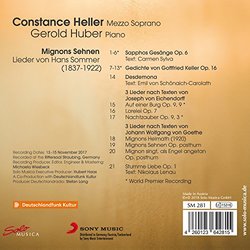| All Artists: Constance Heller, Gerold Huber Title: Mignons Sehnen - Lieder von Hans Sommer (1837-1922) Members Wishing: 0 Total Copies: 0 Label: Solo Musica Release Date: 4/20/2018 Genres: International Music, Pop Styles: Europe, Continental Europe Number of Discs: 1 SwapaCD Credits: 1 |
Search - Constance Heller, Gerold Huber :: Mignons Sehnen - Lieder von Hans Sommer (1837-1922)
 | Constance Heller, Gerold Huber Mignons Sehnen - Lieder von Hans Sommer (1837-1922) Genres: International Music, Pop As a composer Hans Sommer became well known for his songs and especially for his operas. Since, however, no opera of Sommers could hold its own in the repertoire for any length of time, one overlooked easily the quality of... more » |
Larger Image |
CD Details
Synopsis
Product Description
As a composer Hans Sommer became well known for his songs and especially for his operas. Since, however, no opera of Sommers could hold its own in the repertoire for any length of time, one overlooked easily the quality of his works and his contribution to the further development of the opera genre. The songs, sung frequently during their lifetime, disappeared from the repertoire of the singers through the time-boundness of the selected poems; Hans Sommer wrote the most important contributions in the area of the art song at a time when his star was already sinking and he no longer had a large audience. The fact that he published his operas and parts of his song making in self-publishing and the publisher Litolff, who had published at least half of the total of about 300 songs Hans Sommers was dissolved in 1940, a possible revival of works by Hans Sommers has been simply impossible until now. Sommers final compositions, which are centered mainly on Goethes texts, serve as a message to posterity, advocating an intellectual mindset that, throughout his life, was rooted in Naturphilosophie, a philosophical approach to nature that flourished in the German-speaking world in the early 19th century. The selection of texts furthermore bears eloquent testimony to Sommers loneliness in his final years and the unwavering optimism of an incorrigible idealist.
